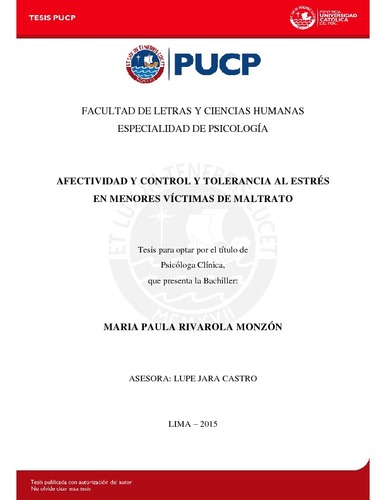| dc.contributor.advisor | Jara Castro, Lupe Isabel | es_ES |
| dc.contributor.author | Rivarola Monzón, Maria Paula | es_ES |
| dc.date.accessioned | 2015-12-14T16:40:07Z | es_ES |
| dc.date.available | 2015-12-14T16:40:07Z | es_ES |
| dc.date.created | 2015 | es_ES |
| dc.date.issued | 2015-12-14 | es_ES |
| dc.identifier.uri | http://hdl.handle.net/20.500.12404/6460 | |
| dc.description.abstract | El maltrato infantil tiene un impacto negativo en el desarrollo y la salud de los niños y niñas. La presente investigación busca describir la afectividad y el control y tolerancia al estrés de un grupo de veinte niños y niñas víctimas de maltrato físico y psicológico. La medición se realizó con el clúster de afectividad y con el de control y tolerancia al estrés del Sistema Comprehensivo para el Psicodiagnóstico de Rorschach (SCR). Los resultados del SCR se contrastaron con la data de Exner (2003) a través de la Prueba T para una muestra, para las variables paramétricas; y con la Prueba de Rangos con signos de Wilcoxon, para las variables no paramétricas. Se encontraron diecisiete diferencias significativas entre los grupos (R, Lambda, EA, lado izquierdo de la EB, lado derecho de la EB, es, lado izquierdo de la eb, m, Sum C’, SumPondC, Afr, CF, Sum T, S, Complj., CDI y DEPI). Los resultados evidencian que los/as niños/as del grupo de estudio presentan un estilo evitativo, que exhiben una fuerte tendencia a la constricción involuntaria y al hipercontrol consciente de sus afectos; y poco interés por rodearse de estímulos emocionales. La mayoría tiene serias dificultades para manejar situaciones socioafectivas y cerca de un tercio presenta una mayor vulnerabilidad para desarrollar depresión u otro trastorno afectivo. El análisis de contenido refleja lo hallado a nivel cuantitativo y también expresa la percepción de los/as niños/as de sus figuras parentales y su deseo por vivir en un entorno más seguro y positivo. Finalmente, la discusión está organizada en torno a tres ejes: la pertinencia de la elección del instrumento para trabajar con la población del estudio; el análisis de los contrastes encontrados entre el grupo de participantes y la data de Exner (2003), y el análisis de contenido; y los alcances y limitaciones de este trabajo. | es_ES |
| dc.description.abstract | Child maltreatment has a negative impact in the development and health of children. The present investigation sought to describe the affect and control and stress tolerance of a group of twenty physically and psychologically abused children. The measurement was performed with the cluster of affect and the one of control and stress tolerance of the Comprehensive System for the Rorschach Test. The results from the Rorschach Test were contrasted with Exner’s data (2003) through the T-Test for one sample, in the case of the parametric variables; and with the Wilcoxon signed-rank Test, in the case of the non parametric variables. Seventeen significant differences were found between the groups (R, Lambda, EA, left side of EB, right side of EB, es, left side of eb, m, Sum C’, WSumC, Afr, CF, Sum T, S, Blends, CDI y DEPI). The results show that children of the study group have an avoidant style, a strong tendency to involuntary affective constraint and an aware hypercontrol of emotions; and little interest in surround themselves with emotional stimuli. Most of them have serious difficulties to cope with socio-emotional situations and about a third of the group show increased vulnerability to develop depression or another mood disorder. The content analysis is consistent with what was found quantitatively and it also shows the perception that these children have of their parental figures and their wish to live in a safer and much positive environment. Finally, the discussion is organized around three main topics: the pertinence of the instrument for this group, the analysis of the found contrasts between the participants and Exner’s data (2003) and the content analysis; and the extensions and limitations of this research. | es_ES |
| dc.language.iso | spa | es_ES |
| dc.publisher | Pontificia Universidad Católica del Perú | es_ES |
| dc.rights | Atribución-NoComercial-SinDerivadas 2.5 Perú | * |
| dc.rights | info:eu-repo/semantics/openAccess | es_ES |
| dc.rights.uri | http://creativecommons.org/licenses/by-nc-nd/2.5/pe/ | * |
| dc.subject | Abuso de niños | es_ES |
| dc.subject | Prueba de Rorschach | es_ES |
| dc.subject | Afecto (Psicología). | es_ES |
| dc.title | Afectividad y control y tolerancia al estrés en menores víctimas de maltrato | es_ES |
| dc.type | info:eu-repo/semantics/bachelorThesis | es_ES |
| thesis.degree.name | Licenciado en Psicología Clínica | es_ES |
| thesis.degree.level | Título Profesional | es_ES |
| thesis.degree.grantor | Pontificia Universidad Católica del Perú. Facultad de Letras y Ciencias Humanas. | es_ES |
| thesis.degree.discipline | Psicología Clínica | es_ES |
| renati.discipline | 313026 | es_ES |
| renati.level | https://purl.org/pe-repo/renati/level#tituloProfesional | es_ES |
| renati.type | http://purl.org/pe-repo/renati/type#tesis | es_ES |
| dc.publisher.country | PE | es_ES |
| dc.subject.ocde | https://purl.org/pe-repo/ocde/ford#5.01.00 | es_ES |






